ECHO: A System for Fighting Childhood Obesity with Screening, Intervention and Tracking.
Childhood obesity is a serious national public health epidemic in the United States threatening the health of millions of children/youth. Over the past three decades, according to many national studies, obesity rates in the US have more than doubled among children ages 2 to 5 and more than tripled among those ages 6 to 11. Roughly, nine millions kids over the age of 6 are considered obese and the health consequences are already apparent. More and more children are being diagnosed with diseases previously considered adult illnesses. Developing a mass, effective tracking and intervention system to fight childhood obesity is a national health imperative.
State of Illinois, like other parts of the county, has seen obesity prevalence also continuously increase during the past decades. Fifty nine percent of Illinois adults are overweight or obese (23.2% obese). The obesity rate among Illinois adults doubled between 1990 and 2002. Fourteen percent of low-income children between two and five years of age in Illinois are overweight. (Source: Trust for America's Health.)
With the support of the Illinois Department of Public Health, we have begun an effort to collect and store the Child Health Exam Certificate (CHEC) records in a statewide database. Currently, this database serves mainly the group-data storage and analysis functions, and no individual tracking and intervention functions are included.
The purpose of our project is to develop and pilot a state-wide, state-of-the-art student personal health record tracking system called ECHO (Electronic Children Health Observatory) that can screen and track childhood obesity, as well as provide intervention if needed, for the State of Illinois.
There are three specific aims in this study:
- To complete the development of the major system architecture of ECHO and its application elements;
- To pilot the system in different application settings and to evaluate the efficiency and utility of the system;
- To modify the system based on the feedback, develop instructions for the future implementation of the system and estimate the cost of the implementation.
Test application and database
A prototype of database of children has been developed.
Any real application, of course has to deal with either Parental authorization for ANY sharing outside school or comply with Health Insurance Portability and Accountability Act (HIPAA) and Family Educational Rights and Privacy Act (FERPA) de-identification procedures.
For more information on HIPAA
and FERPA,
see a handbook that "provides practical guidance to help school district personnel navigate the myriad and sometimes conflicting legal
considerations connected to managing student health information.":
N. Schwab, M. Rubin, J.A. Maire, M. Gelfman, M.D. Bergren, D. Mazyck and B Hine
Protecting and disclosing student health information: Guidelines for developing school district policies
and procedures.
Kent, OH: ASHA. 2005.
CHEC form processing
System is required for the automated extraction of handwritten information from Department of Human Services (DHS) paper forms that parents fill out with child's health history. The form is not standardized for automated data extraction and inconsistency of labeling may exist. Additionaly distortion is introduced via faxing and scanning.
We have also prototyped ECHO system by collecting the forms for recognition and extraction of handwritten information as well as classification of binary answers with high confidence.
An example CHEC form is shown in Figure 1. The two images in Figure 1 illustrate document warping due to faxing and scanning, as it poses challenges to automated processing. Once information has been extracted from the form, it is then analyzed using various classification schemes (e.g. Body Mass Index) to provide better understanding of the health records.
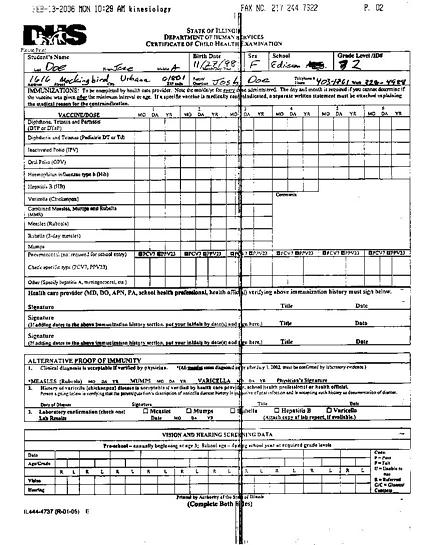
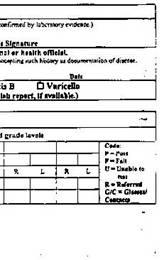
Figure 1. (a) An example of Child Health Exam Certificate (CHEC) form: Document with fax related artifact in the middle. (b) Detail of scanned document and its incomplete lines due to scanning process.
A system for automated processing has been developed will following features:
(a) Scanning and storing forms, (b) registration of scanned forms, (c) extraction of binary entries,
(d) extraction of handwritten entries, (e) alternative PDF document processing
Registration of Scanned Forms
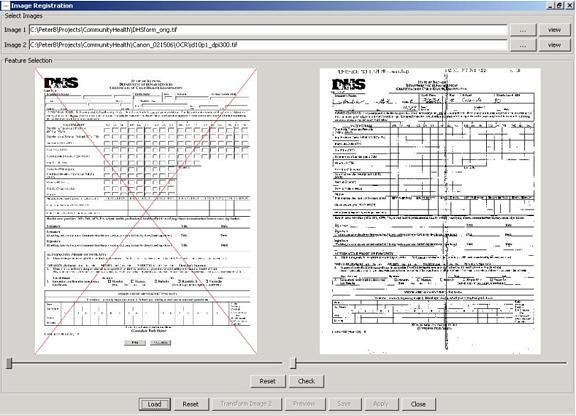
Figure 2. Registration tool. (Left) Original CHEC form and faxed and scanned copy (right).
Registration is either Manual by selecting control points or Automated by image feature matching.
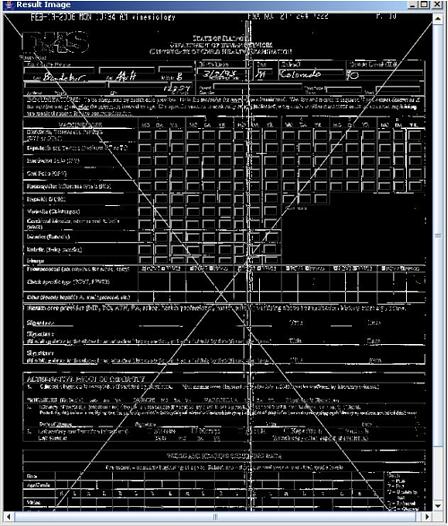
Figure 3. Original form registered with the scanned one is shown as subtracted image.
Extraction of Binary Entries
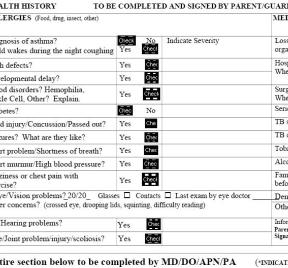
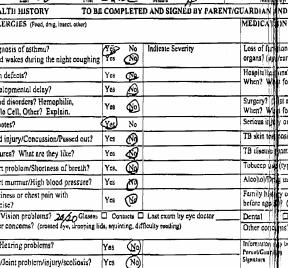
Figure 4. Comparison of the checked answers (left) and distorted ones (right). Analysis of sub-areas.
The statistical data from ECHO system can aid Illinois schools in decision making such as improving lunch, recess, and physical education programs. One possibility to monitor and encourage child physical activity is the use of pedometers, portable devices which sense body motion and count each footstep. It is known that pedometers can also be a motivation tool to increase physical activity. New generation of pedometers can be kept on all day, the daily record can be uploaded to and graphed by the computer.
We propose use of pedometer (for example Omron HJ-720 ITC with USB link) in monitoring child's effort to excercise. Web interface for loading/parsing of tables can be linked to student IDs in DHS form or exist independently.
Body Mass Index is a number calculated from a person's weight and height. BMI is a reliable indicator of body fatness for people. With the metric system, the formula for BMI is weight in kilograms divided by height in meters squared:
BMI = weight (kg) / [height (m)]2
Use Adult BMI Calculator and BMI Calculator for Child and Teen.
The amount of body fat of children changes with age and it also differs between girls and boys. BMI for Children and Teens (often referred to as BMI-for-age) is age and sex specific. After BMI is calculated for children and teens, the BMI number is plotted on the BMI-for-age growth charts to obtain a percentile ranking. The percentile is a relative measure of the child's BMI number among children of the same sex and age. Individual charts are available for Children and Teens. (In pdf format. Source: Department of Health and Human Services, Centers for Disease Control and Prevention.)
| Adults | Children and Teens | ||
|---|---|---|---|
| Weight Status | BMI | Weight Category | BMI-for-age Range |
| Underweight | < 18.5 | Underweight | <5th percentile |
| Normal | 18.5 - 24.9 | Healthy weight | 5th < BMI-for-age <85th |
| Overweight | 25.0 - 29.9 | At risk of overweight | 85th< BMI-for-age <95th |
| Obese | 30.0 < | Overweight | 95th< percentile |
Classification of weight status for adults over 20 years of age based on Body Mass Index (gray columns) and children and adults 2-20 years old based on BMI-for-age (yellow). (Source Department of Health and Human Services, Centers for Disease Control and Prevention.)
Collaborators
- Prof. Weimo Zhu
Department of Kinesiology and Community Health, College of Applied Health Sciences, UIUC - Ms. Heidi Krahling
Department of Kinesiology and Community Health, College of Applied Health Sciences, UIUC - Dr. Radha Nandkumar
NCSA, UIUC - Prof. Peter Bajcsy
ISDA, NCSA - Dr. Sang-Chul Lee
ISDA, NCSA - Tim Nee
ISDA, NCSA - Dr. Maryann Mason
Children's Memorial Hospital, Northwestern University - Ds. Patricia Meleedy-Rey
Children's Memorial Hospital, Northwestern University - Dr. Jeff Sunderlin
Illinois Department of Public Health - Ms. Sharon Neely
Illinois State Board of Education (ISBE)
This research is supported by the Illinois Department of Public Health and the Centers for Disease Control and Prevention (CDC)





